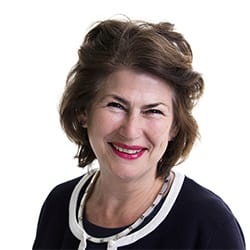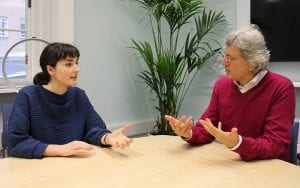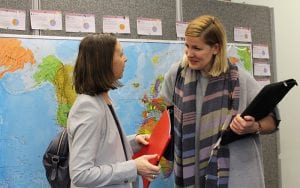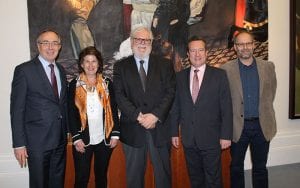Championing academic freedom in Europe
By ucypnmb, on 8 May 2018
 In my last VP view I wrote that a global strategic focus will not constrain UCL’s academic freedom and creativity. We have started to think how our Global Engagement Strategy could do better than that, and actively champion academic freedom. And we will start with Europe, for obvious reasons.
In my last VP view I wrote that a global strategic focus will not constrain UCL’s academic freedom and creativity. We have started to think how our Global Engagement Strategy could do better than that, and actively champion academic freedom. And we will start with Europe, for obvious reasons.
Recent criticism of universities (including UCL) in the media, and being on the Advisory Board of UCL’s Centre for Global Higher Education (CGHE), made me think about why it seems increasingly hard for people to see the incredible social benefits universities bring. Professor Michael Ignatieff, President of the Central European University, helped answer that question in his keynote at this year’s CGHE conference. You can watch his inspiring and challenging talk on ‘Academic freedom and the future of Europe’ in this video.
Prof Ignatieff argues that academic freedom is a core European value and a right that protects us all, not a privilege of the professorial elite as it is sometimes misrepresented. His description of universities as “counter-majoritarian institutions” – as vital to society as a free press and an independent judiciary, in counter-balancing majority governments – struck a particular chord with me. Democracy should not be equated with majoritarianism. I saw the risks of that, at first hand, in South Africa. In the UK, the “the will of the people” mantra, after the EU referendum, implied a majoritarian interpretation.
In a recent blog post for WonkHE: ‘By 2030, will universities ‘walk fast and alone – or walk far and together’?, I explored what higher education leaders could do for the best at a time when both the public benefit of universities and the benefits of globalisation are disputed.
 This includes promoting the freedom to share knowledge and collaborate, which was part of UCL’s founding ethos. Ways in which we continue to do that include UCL’s longstanding partnership with Cara (the Council for At Risk Academics). Through that partnership, we support academics who have been unable to continue their work in their home countries. One example is Dr Naif Bezwan, from Turkey, and you can read UCL’s Cara student ambassador Miriam Matthiessen’s feature about Dr Bezwan here.
This includes promoting the freedom to share knowledge and collaborate, which was part of UCL’s founding ethos. Ways in which we continue to do that include UCL’s longstanding partnership with Cara (the Council for At Risk Academics). Through that partnership, we support academics who have been unable to continue their work in their home countries. One example is Dr Naif Bezwan, from Turkey, and you can read UCL’s Cara student ambassador Miriam Matthiessen’s feature about Dr Bezwan here.
Continued appetite for European collaboration
UCL now has nearly 200 European Research Council grantees and has published more than 24,000 papers with EU partners over the past five years. It is inspiring how UCL academics, at all stages of their careers, seem to have a natural reflex to seek out international collaborators. The explanation colleagues give me is that science (in the widest sense) is inherently global. Science has no nationality, as Imran Khan from the Wellcome Trust reminded us during a panel discussion with the Spanish Minister for Science and Innovation at UCL last month.
In the UCL School of Slavonic and East European Studies, 15 early career researchers are studying the rise of right-wing populism in post-communist Europe as part of the EU-funded FATIGUE project, under the Marie Skłodowska-Curie Innovative Training Networks. These networks aim to train a new generation of creative, entrepreneurial and innovative early stage researchers to convert their knowledge and ideas into products and services for economic and social benefit.
UCL academics are helping to increase independent research capability around the world in many other ways. You may have heard about two successful Horizon 2020 Teaming projects underway: RISE and the Discoveries Centre for Regenerative and Precision Medicine.
RISE is the first research centre in Cyprus focusing on interactive media, smart systems and emerging technologies, aiming to become a centre of excellence empowering knowledge and technology transfer in the region. UCL’s team of Alastair Moore (UCL Advances), Professors Anthony Steed and Niloy Mitra (Department of Computer Science), Michael Browne and Martin Scott (European Research & Innovation) and Peter Reid (London Technology Network) are collaborating with the three public universities of Cyprus, the Municipality of Nicosia and the Max Planck Institute for Informatics.
 The Discoveries team working with a consortium of Portuguese Universities is led by Professor Jonathan Knowles, (UCL Eastman Dental Institute), with Ivan Wall (Department of Biochemical Engineering), Giampietro Schiavo (Institute of Neurology), Andreas Schätzlein (School of Pharmacy), Vivek Mudera (Division of Surgery), Richard Day (Division of Medicine), Tim McHugh (Division of Infection and Immunity) and Dr Jane Kinghorn (Translational Research Office). This multi-site venture is aimed at enhancing regenerative medicine research in Portugal, and launched in February this year.
The Discoveries team working with a consortium of Portuguese Universities is led by Professor Jonathan Knowles, (UCL Eastman Dental Institute), with Ivan Wall (Department of Biochemical Engineering), Giampietro Schiavo (Institute of Neurology), Andreas Schätzlein (School of Pharmacy), Vivek Mudera (Division of Surgery), Richard Day (Division of Medicine), Tim McHugh (Division of Infection and Immunity) and Dr Jane Kinghorn (Translational Research Office). This multi-site venture is aimed at enhancing regenerative medicine research in Portugal, and launched in February this year.
Strengthening partnerships and dialogues
UCL and Belgium’s KU Leuven have a number of collaborations, the strongest of which is in neuroscience. This year, UCL’s Faculty of Brain Sciences signed a Memorandum of Understanding with KUL to undertake research and education in the field of dementia and related neurodegenerative diseases. This will include vital work on areas such as developing a single cell brain atlas of Alzheimer’s disease, humanized models for Alzheimer Disease, neuroinflammation and drug screening. The collaboration is led by Prof Bart de Strooper, who along with Prof John Hardy, won this year’s prestigious Brain Prize.
The Brain Prize is awarded annually by one of Denmark’s largest commercial foundations, The Lundbeck Foundation, and it was unprecedented for academics from the same institution – UCL – to receive the world-renowned accolade two years in a row. Last year’s winners were Prof Ray Dolan and Prof Peter Dayan, who lead the joint Max Planck-UCL Centre for Computational Psychiatry and Ageing Research, which has recently submitted its renewal proposal. The collaboration builds on the strong, multi-faculty partnership UCL has with Germany’s Max Planck Society. International recognition of UCL’s pioneering research is good news for the academics concerned, for our university – and for public understanding of the social benefits research brings.
 UCL also continues to encourage open dialogue on science and research with our European neighbours. Earlier this year UCL academics joined scientific attachés from 15 European Embassies for a London Diplomatic Science Club event to discuss future scientific and research collaboration in Europe, as well as attending the popular talk mentioned above by Carmen Vela, Spanish Minister for Research, Development and Innovation, on the role of research and innovation in creating opportunities for growth and prosperity. That event was jointly organised by UCL’s European Institute, Public Policy team and the Global Engagement Office (GEO). Carmen pointed out that, after the US, the UK is the country with which Spain most often collaborates, and that UCL is Spain’s top collaborator in the UK.
UCL also continues to encourage open dialogue on science and research with our European neighbours. Earlier this year UCL academics joined scientific attachés from 15 European Embassies for a London Diplomatic Science Club event to discuss future scientific and research collaboration in Europe, as well as attending the popular talk mentioned above by Carmen Vela, Spanish Minister for Research, Development and Innovation, on the role of research and innovation in creating opportunities for growth and prosperity. That event was jointly organised by UCL’s European Institute, Public Policy team and the Global Engagement Office (GEO). Carmen pointed out that, after the US, the UK is the country with which Spain most often collaborates, and that UCL is Spain’s top collaborator in the UK.
Dr Aline Courtois’ (UCL Institute of Education) fascinating CGHE report on “Higher education and Brexit: current European perspectives” is a sobering reminder of the importance of universities in Europe continuing to seek out new opportunities to work together.
What GEO is doing to help
As Brexit gets closer, GEO continues to prioritise strengthening UCL engagement with European colleagues, supporting UCL academics to connect with European colleagues who share their passion for knowledge and dedication to excellence.
Academics of any discipline wanting to kick-start or strengthen their collaborations in Europe (or further afield) can now apply to the Global Engagement Funds, which are open until 17 May. You can see some examples of how previous winners used their funding on our website here.
Dr Florian Mussgnug (School of European Languages, Culture and Society) is leading the Rome Multidisciplinary Research Hub, supported by GEO, which is fostering collaboration with Italian partners to encourage research excellence and international mobility across disciplines. See upcoming events here.
 UCL and Université PSL (Paris Sciences & Lettres) recently launched new joint research seed funding to support activity across arts, humanities and social sciences. New collaborations will consider pressing global challenges such as ‘The global, the national, and the European in an age of populism’ and ‘Migration, race, religion, terror’.
UCL and Université PSL (Paris Sciences & Lettres) recently launched new joint research seed funding to support activity across arts, humanities and social sciences. New collaborations will consider pressing global challenges such as ‘The global, the national, and the European in an age of populism’ and ‘Migration, race, religion, terror’.
GEO continues working closely with colleagues across the university as part of the Provost’s Brexit Mitigation Group. Look out for a Provost’s View next month which will focus on the exciting new Cities Programme that UCL is launching to support continued academic collaboration with our European counterparts.
Regional news in brief
East Asia:
- We’ll soon be announcing the winners of this year’s UCL-Peking University (PKU) strategic partner funds. The panel received so many strong applications that they have decided to fund more than last year – 14 collaborative projects across 7 faculties. The reports received from last year’s projects look really promising – one example is Professor Nick Greene’s (UCL GOS Institute of Child Health) work on neural tube defects.
- Following the successful PKU presidential delegation visit to UCL in March, last week I attended PKU’s 120th anniversary celebrations and the World University President’s Forum.
- Fukushima Prefecture, with which UCL has a longstanding collaboration, hosted a delegation including staff and students from UCL’s Institute for Risk & Disaster Reduction, EPICentre and UCL Academy. Read UCL student Conor Galbraith’s great blog about the experience.
South Asia:
 UCL academics Professor Sarah Hawkes (UCL Centre for Gender and Global Health), Professor David Osrin (UCL Institute for Global Health), and Professor Margaret O’Brien (UCL Institute for Education) joined policy makers, development experts, NGOs and grassroots workers to help shape gender equality policy at the 2018 Difficult Dialogues forum in Goa.
UCL academics Professor Sarah Hawkes (UCL Centre for Gender and Global Health), Professor David Osrin (UCL Institute for Global Health), and Professor Margaret O’Brien (UCL Institute for Education) joined policy makers, development experts, NGOs and grassroots workers to help shape gender equality policy at the 2018 Difficult Dialogues forum in Goa.- UCL’s MAPS faculty hosted a visit from the Indian Institute of Astrophysics this month to discuss ongoing collaboration.
- This September, Provost will lead a delegation visit to meet key partners in India including the Indian Institute of Science Bengaluru and the All India Institute of Medical Sciences.
North and Latin America:
- UCL has been strengthening its engagement in Mexico this year – Pro-Vice-Provost (Latin America) Professor Alejandro Madrigal led a visit to key partners, and GEO’s Alejandro Moreno and Chris Cook presented on the Global Engagement Funds at the North American Center for Collaborative Development (NACCD) conference, and promoted UCL’s Summer School on Mexican radio.
- After the Provost hosted a University of Toronto delegation to develop health science collaborations in January, UCL The Bartlett ran a joint workshop with UoT on Cities in April.
- I welcomed Professor Pericles Lewis, the new Vice President (Global Strategy) and Deputy Provost (International Affairs) at Yale University to learn about Yale’s new global engagement strategy and to explore collaborations in Philosophy, Private Law, Neuroscience and Psychiatry and Material Sciences.
- GEO is planning an academic-led visit to Chile in July and we would love to hear about your activity there – in particular with Universidad de Chile and La Pontificia Universidad Católica de Chile. Please contact Rachel Hall to share details of your collaborations.
Africa and Middle East:
 UCL Qatar are undertaking one of the largest research projects in the region on National Museums and the Public Imagination. Led by Dr Karen Exell and a team of international and Qatar-based researchers and academics, the project aims to develop an understanding of the public’s social and cultural perceptions and evaluate the impact of the National Museum of Qatar across Qatari nationals and expatriates. More than 1,500 respondents have taken part in a longitudinal study recording perceptions, values and cultural identity.
UCL Qatar are undertaking one of the largest research projects in the region on National Museums and the Public Imagination. Led by Dr Karen Exell and a team of international and Qatar-based researchers and academics, the project aims to develop an understanding of the public’s social and cultural perceptions and evaluate the impact of the National Museum of Qatar across Qatari nationals and expatriates. More than 1,500 respondents have taken part in a longitudinal study recording perceptions, values and cultural identity.- The first joint UCL-Africa Health Research Institute (AHRI) Symposium, ‘Towards HIV and TB elimination in South Africa,’ took place in February.
- April saw the UK launch of the RELIEF Centre, a transdisciplinary research collaboration led by Professor Henrietta Moore (UCL Institute for Global Prosperity) that focuses on how to build a prosperous and inclusive future for communities affected by mass displacement.
South East Asia and Australasia:
 UCL professors Nick Phelps, Pro-Vice-Provost for South East Asia and Australasia, and Claudio Stern, Vice-Dean (International) for Medical Sciences, joined a delegation visit to leading institutions in Singapore to build on existing UCL research collaborations. As part of that visit, I also attended the Asia-Pacific Association for International Education Presidents’ Roundtable, discussing how universities can prepare students for the future workplace.
UCL professors Nick Phelps, Pro-Vice-Provost for South East Asia and Australasia, and Claudio Stern, Vice-Dean (International) for Medical Sciences, joined a delegation visit to leading institutions in Singapore to build on existing UCL research collaborations. As part of that visit, I also attended the Asia-Pacific Association for International Education Presidents’ Roundtable, discussing how universities can prepare students for the future workplace.
Images:
- Dr Naif Bezwan with Miriam Matthiesen
- Discoveries centre launch
- London Diplomatic Science Club event at UCL
- UCL-PSL funding launch
- Professor Sarah Hawkes at Difficult Dialogues 2018
- National Museum of Qatar: Dr Karen Exell
- UCL delegation in Singapore
 Close
Close


